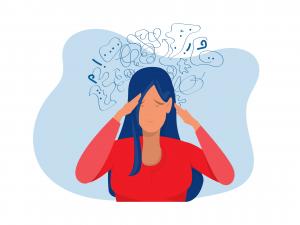Temporal Lobe ADD: Understanding the Link Between Irritability, Panic, and Brain Function
Many individuals suffering from irritability or panic are mislabeled as having personality problems, when in fact their symptoms may be brain-based.”
GULFPORT, LA, UNITED STATES, August 22, 2025 /EINPresswire.com/ -- Attention Deficit Disorder (ADD) is widely associated with inattention, impulsivity, and hyperactivity, but recent attention has been drawn to a lesser-known subtype rooted in brain function: Temporal Lobe ADD. This condition highlights how irritability, panic, and sudden mood changes may stem not from personality or environment alone, but from neurological activity within a specific area of the brain.— Dr. Stanford Owen
What Is Temporal Lobe ADD?
The temporal lobes, located on each side of the brain near the temples, play an important role in regulating memory, emotional stability, and behavioral responses. When this region is affected, individuals may experience symptoms that differ from traditional presentations of ADD.
Temporal Lobe ADD often involves emotional volatility, irritability, panic attacks, and even sudden bursts of aggression or withdrawal. These behaviors may be misinterpreted as psychological or personality-driven, when in reality they may have a neurological basis. The temporal lobe, like the frontal lobe, is prone to damage from head trauma with concussion. The mood changes from trauma were highlighted in movie, "Concussion" starring Will Smith. A great movie on merit but a fabulous movie when considering the impact on concussion prevention it generated in various sports.
The Brain-Behavior Connection
Research shows that irregular activity in the temporal lobes can disrupt the brain’s ability to regulate emotional responses. Instead of calm, measured reactions, individuals may experience heightened irritability, episodes of panic, or overwhelming fear.
Dr. Stanford Owen, owner of ADD Clinics in Gulfport, Mississippi, noted the importance of distinguishing neurological causes from purely behavioral ones.
“Many individuals suffering from irritability or panic are mislabeled as having personality problems, when in fact their symptoms may be brain-based. Understanding the role of the temporal lobes helps create a clearer picture of what is happening and why treatment should consider neurological function, not just external behavior,” said Owen.
Symptoms Beyond Attention
While inattentiveness and difficulty focusing remain part of the picture, Temporal Lobe ADD brings with it symptoms that may surprise families and clinicians. These include:
Sudden episodes of anger or irritability.
Panic or fear that arises without clear cause.
Difficulty with memory or recalling words.
Unusual sensory experiences, such as déjà vu or heightened sensitivity to sounds.
Periods of withdrawal or isolation.
Because these symptoms do not fit the traditional definition of ADD, misdiagnosis is common. In some cases, individuals may be treated for anxiety disorders, mood disorders, or even personality disorders without addressing the underlying neurological involvement.
The Importance of Accurate Diagnosis
Accurate diagnosis is critical in cases of Temporal Lobe ADD. Standard behavioral assessments may overlook brain-based causes, leading to ineffective or incomplete treatment. Comprehensive evaluation—including neurological assessment and medical history—provides a more complete picture.
Failing to identify the neurological component can prolong suffering, leaving individuals without access to effective strategies for management. By bringing attention to temporal lobe involvement, clinicians and families gain insight into behaviors that may otherwise seem confusing or unpredictable.
Treatment Considerations
Treatment approaches for Temporal Lobe ADD often involve strategies that address both the neurological and behavioral components of the condition. Medical therapies may help regulate brain activity, while behavioral support ensures individuals develop coping mechanisms for irritability and panic. Mood stabilizers such as lamotrigine or other anti-epileptics are often helpful.
Lifestyle interventions, such as structured routines, improved sleep hygiene, and stress management, further support treatment outcomes. By acknowledging the neurological foundation of symptoms, care can be better tailored to the individual’s needs.
Broader Implications
The recognition of Temporal Lobe ADD has broader implications for the field of mental health. It challenges long-standing assumptions that certain emotional outbursts or panic episodes are purely psychological. Instead, it highlights the role of brain function in shaping emotional health.
By expanding the understanding of ADD beyond traditional categories, clinicians can improve accuracy in diagnosis, reduce stigma, and offer more effective interventions. Families also benefit from realizing that behaviors often seen as intentional or willful may in fact have a medical explanation.
Reducing Stigma Through Science
One of the most important outcomes of this research is the reduction of stigma. Individuals experiencing irritability or panic may feel misunderstood, blamed, or dismissed. Recognizing the neurological basis for these symptoms helps reframe the conversation from fault to function.
Acknowledging that the brain itself may be responsible opens the door to compassion, informed treatment, and long-term management strategies.
Conclusion
Temporal Lobe ADD underscores the importance of looking beyond surface behaviors when evaluating conditions traditionally associated with attention deficits. Irritability, panic, and sudden mood changes may not simply be psychological but may instead reflect activity within the temporal lobes of the brain.
With accurate diagnosis and treatment that accounts for neurological function, individuals living with this condition can experience improved outcomes and greater understanding from both clinicians and families.
About ADD Clinics
ADD Clinics, based in Gulfport, Mississippi, provides evaluation and treatment for a range of Attention Deficit Disorder presentations. Led by Dr. Stanford Owen, the clinic emphasizes evidence-based approaches that consider both behavioral and neurological factors in patient care.
Morgan Thomas
Rhino Digital, LLC
+1 504-875-5036
email us here
Visit us on social media:
Facebook
Legal Disclaimer:
EIN Presswire provides this news content "as is" without warranty of any kind. We do not accept any responsibility or liability for the accuracy, content, images, videos, licenses, completeness, legality, or reliability of the information contained in this article. If you have any complaints or copyright issues related to this article, kindly contact the author above.


